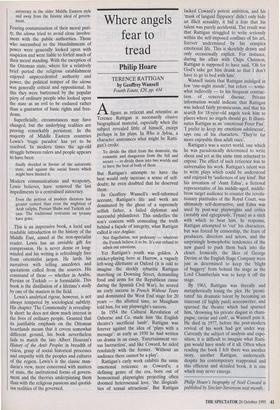Where angels fear to tread
Philip Hoare
TERENCE RATTIGAN by Geoffrey Wansell Fourth Estate, £20, pp. 434 Afigure as reticent and retentive as Terence Rattigan is necessarily elusive biographical material, especially when the subject revealed little of himself, except perhaps in his plays. In Who is Sylvia, a character announces what might be Ratti- gan's credo:
To divide the illicit from the domestic, the romantic and dangerous from the full and secure — to divide them into two worlds and to have the best of both of them . . .
But Rattigan's attempts to have the best would only increase a sense of self- doubt; he even doubted that he deserved them.
In Geoffrey Wansell's well-informed account, Rattigan's life and work are dominated by the ghost of a supremely selfish father, a failed diplomat and successful philanderer. This underlies the son's concern with concealing the truth behind a facade of integrity, what Rattigan called le vice Anglais:
Not flagellation, not pederasty — whatever the French believe it to be. It's our refusal to admit our emotions.
Yet Rattigan's youth was golden. A cricket-playing hero at Harrow, a vaguely left-wing dilettante at Oxford (it is odd to imagine the sleekly sybaritic Rattigan marching on Downing Street, demanding food and arms for the Republican cause during the Spanish Civil War), he scored an early success in French Without Tears and dominated the West End stage for 20 years — the allotted time, so Maugham told him, for any playwright's success.
In 1954 the Cultural Revolution of Osborne and Co. made him 'the English theatre's sacrificial lamb'. Rattigan was forever against the idea of 'plays with a message': as early as 1930 he had written on drama in an essay, 'Entertainment ver- sus Instruction', and like Coward, he sided resolutely with the former. 'Without an audience there cannot be a play'.
Rattigan's early work exhibits the same emotional reticence as Coward's; a defining genre of the era, born out of homosexual playwrights projecting often doomed heterosexual love, 'the illogicali- ties of sexual attractions'. But Rattigan lacked Coward's potent ambition, and his `mask of languid flippancy' didn't only hide an illicit sexuality, it hid a fear that his talent was purely accidental. The result was that Rattigan struggled to write seriously within the self-imposed confines of his art, forever undermined by his complex emotional life. This is sketchily drawn and only occasionally explicit. For instance, during his affair with Chips Channon, Rattigan is supposed to have said, 'Oh for God's sake get him drunk so that I don't have to go to bed with him'.
Wansell insists that Rattigan indulged in few 'one-night stands', but refers — some- what indirectly — to his frequent contrac- tion of venereal disease. Private information would indicate that Rattigan was indeed fairly promiscuous, and that his search for 18-year-old angels took him to places where no angels should go. It illumi- nates Rattigan as an 'emotional Peter Pan'. `I prefer to keep my emotions adolescent', says one of his characters. 'They're far more enjoyable than adult ones'.
Rattigan's was a secret world, one which he was paradoxically determined to write about and yet at the same time reluctant to expose. The effect of such reticence was to universalise his work. Rattigan's talent was to write plays which could be understood and enjoyed by 'audiences of any kind'. But his invention of 'Aunt Edna', a fictional representative of his middle-aged, middle- brow target audience to counter the revolu- tionary platitudes of the Royal Court, was ultimately self-destructive, and Edna was used by post-war playwrights and critics (notably and egregiously, Tynan) as a stick with which to beat him. In response, Rattigan attempted to 'out' his characters, but was forced by censorship, the fears of producers, directors and actors, and the surprisingly homophobic tendencies of the new guard to push them back into the closet. Ironically, the likes of George Devine at the English Stage Company were just as determined to keep the 'blight of buggery' from behind the stage as the Lord Chamberlain was to keep it off the stage.
By 1963, Rattigan was literally and metaphorically losing the plot. He 'prosti- tuted' his dramatic talent by becoming an itinerant (if highly paid) screenwriter, and spurned the theatre which had spurned him, 'drowning his private disgust in cham- pagne, caviar and cash', as Wansell puts it. He died in 1977, before the post-modern revival of his work had got under way. Currently the subject of analysis and expo- sition, it is difficult to imagine what Ratti- gan would have made of it all. Often when reading the book I felt there was another story, another Rattigan, underneath: despite his contemporary reappraisal and this efficient and detailed book, it is one which may never emerge.
Philip Hoare's biography of Noel Coward is published by Sinclair-Stevenson next month.


































































 Previous page
Previous page